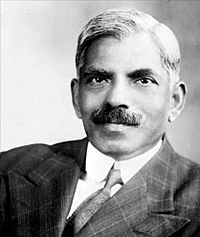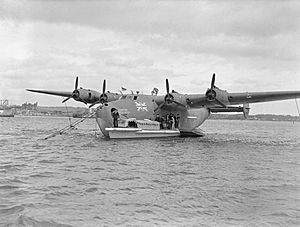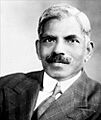Arcot Ramasamy Mudaliar facts for kids
Quick facts for kids
Arcot Ramasamy Mudaliar
|
|
|---|---|

Arcot Ramasamy Mudaliar in 1934
|
|
| 24th Diwan of Mysore | |
| In office August 1946 – November 1949 |
|
| Monarch | Jayachamaraja Wodeyar Bahadur |
| Preceded by | N. Madhava Rao |
| Succeeded by | Position disestablished |
| 1st President of the United Nations Economic and Social Council (ECOSOC) | |
| In office 23 January 1946 – 23 January 1947 |
|
| Preceded by | None |
| Succeeded by | Jan Papanek |
| Member of the Imperial War Cabinet | |
| In office 1942–1945 |
|
| Monarch | George VI |
| Prime Minister | Winston Churchill |
| Succeeded by | War Cabinet disbanded |
| Member of the Viceroy's Executive Council | |
| In office 1939–1942 |
|
| Monarch | George VI of the United Kingdom |
| Governor General | Victor Hope, 2nd Marquess of Linlithgow |
| Personal details | |
| Born | 14 October 1887 Kurnool, Deccan Zone, Madras Presidency, British India (now in Kurnool district, Andhra Pradesh, India) |
| Died | 17 July 1976 (aged 88) Madras (now Chennai), Tamil Nadu, India |
| Political party | Justice Party |
| Alma mater | Madras Christian College |
| Occupation | Diplomat |
| Profession | Lawyer |
Sir Arcot Ramasamy Mudaliar (born October 14, 1887 – died July 17, 1976) was an important Indian lawyer, diplomat, and statesman. He made history as the first president of the United Nations Economic and Social Council. He was also the 24th and last dewan of Mysore.
Mudaliar was a key leader of the Justice Party. He held many important jobs in the government both before and after India became independent. People knew him for his powerful and inspiring speeches.
Contents
Early Life and Education
Arcot Ramasamy Mudaliar was born in Kurnool, a town in British India. He came from a Tamil-speaking family. He was a twin, and his brother was Arcot Lakshmanaswamy Mudaliar.
He went to Municipal High School in Kurnool. Later, he studied at Madras Christian College. He then learned law at Madras Law College. After finishing his studies, he worked as a lawyer. Soon after, he joined the Justice Party and began his political career.
Mudaliar was chosen to be part of the Madras Legislative Council in 1920. He served there until 1926. He was also a member of the Madras Legislative Assembly from 1931 to 1934. He later joined the Imperial Legislative Council from 1939 to 1941.
He was also part of Winston Churchill's war cabinet during World War II. He represented India in the Pacific War Council. Mudaliar was India's delegate to the San Francisco Conference. He became the first president of the United Nations Economic and Social Council. From 1946 to 1949, he served as the last Diwan of Mysore.
Political Journey
Justice Party Leadership
Mudaliar was involved with the Justice Party from its very beginning in 1917. He served as its general secretary. In 1918, he traveled to England with other Justice Party leaders. They went to discuss how different groups should be represented in the government.
Supporting Non-Brahmin Movements
Mudaliar became known as the "brain of the Justice Party." He helped connect non-Brahmin leaders across India. He also helped organize conferences for these groups.
He worked well with leaders from different parts of India, like Shahu Maharaj from Maharashtra. He helped bring these leaders together. Mudaliar spoke at the Satara Non-Brahmin Conference in 1922. He also spoke at the All-India Non-Brahmin Conference in Belgaum in 1924, where his speaking skills were highly praised.
In 1925, he asked for unity among non-Brahmins at a conference. After Sir P.T. Theagaroya Chetty passed away, Mudaliar became the main link between different non-Brahmin groups. He helped organize an All-India Non-Brahmin Confederation in Madras in 1925.
He also helped organize a second conference in Amaravati. At this conference, Mudaliar spoke about how widespread the Non-Brahmin movement had become. He said its ideas had spread quickly across the country.
After the Justice Party lost the 1926 elections, Mudaliar took a break from politics. He became the editor of Justice, the party's newspaper. Under his leadership, the newspaper became very popular and its reach grew a lot. In 1929, he spoke to the Simon Commission about the Justice Party's views.
Important Government Roles
Mayor of Madras
Mudaliar served as the mayor of Madras from 1928 to 1930.
In 1935, he left his role as editor of Justice. This was because he was appointed to the Tariff Board. In 1937, he was honored with a knighthood. At this time, he was also a member of the Council of the Secretary of State for India.
Member of Churchill's War Cabinet

Before Second World War started in 1939, Mudaliar joined the Viceroy's Executive Council. In 1942, he received another knighthood. In July 1942, he was appointed to Winston Churchill's war cabinet. He was one of only two Indians to hold this important position.
Leading the UN Economic and Social Council
Mudaliar represented India at the United Nations San Francisco Conference in 1945. There, he led the committee that discussed global economic and social issues. On January 23, 1946, he was elected as the first president of the Economic and Social Council. This happened during a meeting in London.
Under his leadership, the council called for an international health conference in February 1946. This conference took place on June 19, 1946, and Mudaliar opened it. It was at this conference that the World Health Organization was created. Delegates from 61 nations approved its constitution. After his one-year term, he returned to India.
Diwan of Mysore
In 1946, Maharaja Jayachamaraja Wadiyar appointed Mudaliar as the Dewan of Mysore. He took over from Sir N. Madhava Rao. His time as Dewan was a very busy period in Mysore's and India's history.
In June 1947, Earl Louis Mountbatten announced that India would be divided into two independent countries. This news greatly affected the Indian states. Mudaliar held a press conference in Bangalore. He announced that Mysore would join the new dominion of India. They would also send representatives to the Constituent Assembly of India.
The British Parliament then passed the Indian Independence Act 1947 in July 1947. This act created the independent countries of India and Pakistan. It also freed the Indian states from British control. Many people worried about what this freedom meant for the over 560 Indian states. Indian leaders created an Instrument of Accession. This document asked rulers to join the new government for defense, communication, and foreign affairs.
Jayachamaraja Wadiyar signed this document on August 9, 1947. Mountbatten accepted it on August 16, 1947. This also encouraged local Congress leaders to ask for a responsible government. This led to a movement called "Mysore Chalo." Some people mistakenly thought the Maharaja was refusing to join India. But the truth was, India had just become an independent country.
Jayachamaraja Wadiyar was one of the first rulers to sign the agreement. Soon after, on September 24, 1947, he agreed to set up a new government. On October 25, 1947, K.C. Reddy became the first chief minister. Mudaliar continued to connect the cabinet with the Maharaja.
Jayachamaraja Wadiyar accepted the recommendation to adopt the Constitution of India for the state. Mysore became a Part-B state in the new Republic of India. The Maharaja made this official on November 25, 1949. With this, the position of Dewan was also ended.
During his time as Dewan, Mudaliar organized many Tamil music concerts. These concerts helped raise money to restore the tomb of the Carnatic musician Tyagaraja at Tiruvaiyaru.
Jawaharlal Nehru sent Mudaliar to New York. He led the Indian team to argue India's case in the Security Council. This was when Hyderabad appealed against joining India. Mudaliar spoke very well for India. The council eventually decided in India's favor.
Later Career
On January 5, 1955, the Industrial Credit and Investment Corporation of India (ICICI) was started. Mudaliar was chosen as its first chairman.
Mudaliar also helped the Murugappa Group set up Tube Investments of India Limited. In his later years, he served as the chairman of this company until he passed away in 1976.
The Murugappa Group, which is run by members of his family, also runs the A.R.L.M. Matriculation Higher Secondary School in Cuddalore in his memory. His family members now live in the United States, Canada, and Australia.
Honors and Recognition
Oxford University gave him an honorary degree, the Doctor of Civil Law. This was to recognize his important work during the Second World War.
Mudaliar received the Padma Bhushan award in 1954. He was also awarded the Padma Vibhushan in 1970. These are two of India's highest civilian honors.
Images for kids
-
Poole, Dorset, Digvijaysinhji Ranjitsinhji, the Maharajah Jam Sahib of Nawanagar and Sir A. Ramaswamy Mudaliar arrived from India for talks with the War Cabinet (between 1940 and 1945).
 | Percy Lavon Julian |
 | Katherine Johnson |
 | George Washington Carver |
 | Annie Easley |



